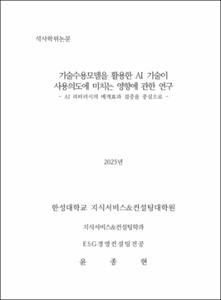기술수용모델을 활용한 AI 기술이 사용의도에 미치는 영향에 관한 연구
= A Study on the Impact of Artificial Intelligence Technology on Intention to Use Using Technology Acceptance Model : Focused on the Mediating Effects of AI Literacy
- Type
- Thesis
- Alternative Title
- AI 리터러시의 매개효과 검증을 중심으로
- Advisor
- 정진택
- Department
- 지식서비스&컨설팅대학원 지식서비스&컨설팅학과
- Issued Date
- 2025
- Publisher
- 한성대학교 지식서비스&컨설팅대학원
- Appears in Collections:
- 지식서비스&컨설팅학과 > 1. Thesis
- Files in This Item:
-
-
Download
 200000850553.pdf
기타 데이터 / 914.78 kB / Adobe PDF
200000850553.pdf
기타 데이터 / 914.78 kB / Adobe PDF
-
Items in Repository are protected by copyright, with all rights reserved, unless otherwise indicated.